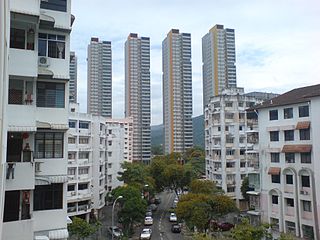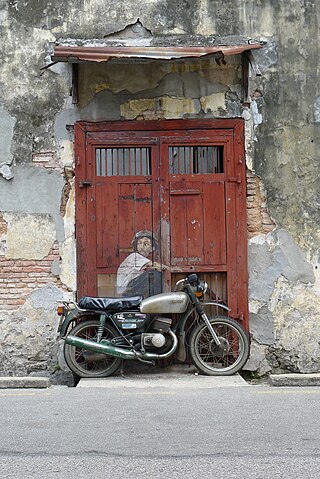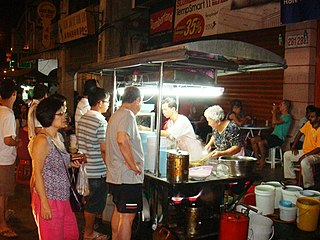
Penang is a Malaysian state located on the northwest coast of Peninsular Malaysia along the Strait of Malacca. It has two parts: Penang Island, where the capital city, George Town, is located, and Seberang Perai on the Malay Peninsula. These two halves are physically connected by the Penang Bridge and the Second Penang Bridge. The state shares borders with Kedah to the north and east, and Perak to the south.

George Town is the capital of the Malaysian state of Penang. It is the core city of the George Town Conurbation, Malaysia's second largest metropolitan area with a population of 2.84 million and the second largest metropolitan economy in the country. The city proper spans an area of 306 km2 (118 sq mi) encompassing Penang Island and surrounding islets, and had a population of 794,313 as of 2020.

The Democratic Action Party is a centre-left social democratic political party in Malaysia. As one of four component parties of the Pakatan Harapan (PH) coalition, it formed the federal government after defeating Barisan Nasional (BN) in the 2018 Malaysian general election, ending the party's 53 year-long stay in the opposition. However, before the coalition finished its first term, defections from partnering parties caused it to lose power after 22 months, culminating in the 2020 Malaysian political crisis. At the 2022 Malaysian general election, the PH coalition which the DAP was part of was returned to power again, albeit without a majority, leading it to form a unity government with political rivals. It is one of the four component parties of the Pakatan Harapan ruling coalition in Malaysia.

The Tun Abdul Razak Complex is a civic complex of five buildings within the central business district of George Town, Penang. It first opened on 2 December 1976. At the time of its completion in 1985, the central skyscraper of the complex, Komtar Tower, at 231.7 metres (760 ft), was the tallest skyscraper in Southeast Asia. The complex contains 1,420,000 square feet (132,000 m2) of office and retail space on a 27-acre (11 ha) superblock. It is a major bus terminal for Rapid Penang, and the seat of the Penang state government and the chief minister of Penang.

The Cheong Fatt Tze Mansion is a government gazetted heritage building located on Leith Street in George Town, Penang, Malaysia. The mansion's external decorations and indigo-blue outer walls make it a very distinctive building, and it is sometimes referred to as The Blue Mansion. Built by the merchant Cheong Fatt Tze at the end of the 19th century, the mansion has 38 rooms, 5 granite-paved courtyards, 7 staircases and 220 vernacular timber louvre windows. It served as Cheong's private residence as well as the seat of his business activities in Penang.

Seberang Perai is a city in the Malaysian state of Penang. Located on the Malay Peninsula and separated from Penang Island by the Penang Strait, it shares borders with Kedah to the north and east and Perak to the south. The city spans an area of 748 km2 (289 sq mi) and had a population of 946,092 as of 2020, making it the third largest city in Malaysia.

Batu Kawan is an island and suburb of Seberang Perai in the Malaysian state of Penang. It is geographically separated from the rest of Seberang Perai by the Jawi and Tengah rivers. As of 2020, Batu Kawan contained a population of 11,409.

Paya Terubong is a suburb of George Town in the Malaysian state of Penang. Located nearly 7 km (4.3 mi) southwest of the city centre, it is nestled within the central valleys of Penang Island and south of Air Itam. Originally an agricultural village, rapid development in the last decades of the 20th century has transformed the area into a residential suburb.

Batu Lanchang is a residential neighbourhood within the downtown core of George Town in the Malaysian state of Penang. It is sandwiched between Farlim to the west and Jelutong to the east.

As the core of Malaysia's second largest conurbation, Penang has a relatively developed transport infrastructure. The state is well-connected by land, air and sea. The Penang International Airport is Malaysia's third busiest by passenger traffic and the busiest by export volume, while the Port of Penang is the main transshipment hub of northern Malaysia. The island city of George Town is physically connected to mainland Seberang Perai by two road bridges and the oldest ferry service in the country. The North–South Expressway and Keretapi Tanah Melayu's west coast line – two major arteries along western Peninsular Malaysia – run through the state.

Farlim, officially Bandar Baru Ayer Itam, is a residential neighbourhood within the city of George Town in the Malaysian state of Penang. Located 6 km (3.7 mi) southwest of the city centre, the township was created in the 1980s. Over the recent decades, Farlim has witnessed rapid development with several residential and commercial developments within the area.

Han Chiang High School (韩江中学) is a Chinese independent high school in Jalan Han Chiang, Penang, Malaysia. The school was founded in 1950 by the Teow Chew Association of Penang and a local businessman, Lim Lean Teng. Teng gave the school and Han Chiang Primary School a piece of land measuring.

Abdul Muid bin Abdul Latif was a Malaysian-based web designer, graphic designer and digital artist, who is known for promoting the cultural elements of the Southeast Asia from Batik and Songket into his commercial works and artworks.

Ernest Zacharevic is a multidiscipline contemporary and public artist based in Penang, Malaysia.

Straits Quay Retail Marina is a shopping mall-cum-marina within George Town in the Malaysian state of Penang. Located at Tanjong Pinang, it was opened in 2010 and includes a marina designed for small recreational vessels, as well as a convention centre.

Penangite Chinese are ethnic Chinese Malaysians of full or partial Chinese ancestry who either hail from or live within the State of Penang. As of 2020, 45% of Penang's population belonged to the Chinese ethnic group, making ethnic Chinese the largest ethnic community within the state.

Cycling in Penang Island refers to the use of bicycles in the city of George Town and elsewhere on Penang Island, Malaysia, either for recreational, touring or transportation purposes. While bicycles have long been in use in Penang, with rickshaws becoming a unique application of the pedal-driven vehicle in the state, the usage of bicycles has noticeably declined since the late 20th century due to the proliferation of cars as the main transportation mode.
The Penang Transport Master Plan was drawn up to address the deteriorating traffic conditions in Penang and is projected to cost RM46 billion.

The Penang House of Music (PHoM) is an interactive music gallery in George Town, Malaysia. It consists of a gallery, a performing/exhibition space, and a resource centre that documents Malaysia's musical heritage with a focus on Penang's music and musicians. It is located on the 4th floor of the ICT Digital Mall, Penang and covers 650 square metres. The gallery has earned a reputation as a kinaesthetic learning experience of music, culture, arts and social studies and its resource centre houses one of the largest collections of Malaysia's music, culture and performing arts. Here, various audio visual materials relating to Malaysia's music and history is documented, catalogued and digitised.



















